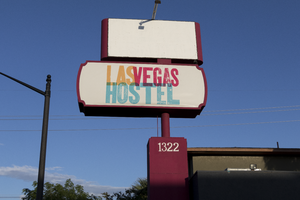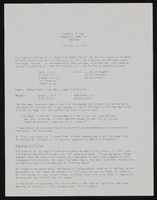Search the Special Collections and Archives Portal
Search Results

Transcript of interview with Valerie Wiener by Barbara Tabach, January 20, 2015
Date
Archival Collection
Description
Valerie Wiener is an accomplished state senator, business owner, president and founding member of the Public Service Institute of Nevada and the Valerie Wiener Foundation. She was born October 30, 1948 in Las Vegas, Nevada. Her service as senator for 16 years and her role as a public servant led her to become the first woman assistant majority leader of the state senate in Nevada. She graduated with a bachelor degree of Journalism at the University of Missouri/Columbia within the School of Journalism earning a Masters of Arts in Broadcast Journalism and a Master of Arts in Literature at the University of Illinois in Springfield while attending law school at McGeorge School of Law in Sacramento in the 1970s. Her generosity is also seen through scholarships and activities at the Louis Wiener Jr. Elementary School. In addition, Valerie is a professional speaker, consultant, and internationally published author. She is the recipients of many awards, such as: ?Women of Achievement Award? in Media; ?Healthy Schools Heroes?; ?Public Affairs Champion Award?; ?Legislator of the Year?, and the Nevada Secretary of State?s recipient of the ?Jean Ford Participatory Democracy Award.? She stays active through her commitment to the Nevada Senior Olympics for both Fitness and Weightlifting earning 17 gold medals from 1998 to 2007. In this interview, Wiener discusses her childhood and being raised in Las Vegas in the 1950s as well as the academic path that led her career into politics. She shares memorable insight into the life of her father, Louis Isaac Wiener, Jr., an accomplished attorney and business man who represented the infamous Benjamin ?Bugsy? Siegel during the construction and opening of the Flamingo Hotel and Casino in 1946. Throughout Wiener?s interview, she highlights the traditions of the small, but growing Las Vegas Jewish population in the 1960s. Among the people she recalls most vividly is her grandmother Kitty Wiener. Wiener also discusses her community service work and her life mantra of giving.
Text

Transcript of interview with Suzie Chenin by Barbara Tabach, September 29, 2015
Date
Archival Collection
Description
In this interview, Suzie discusses growing up in Las Vegas, with a strong community of friends, particularly within Temple Beth Sholom. She also talks about her real estate career, both in residential and commercial properties, highlighting some of the successes and challenges. She describes her working relationship with Milton Schwartz, as well her time working with the Greenspuns while selling advertising at the Las Vegas Sun.
Suzie Chenin was born in Cleveland, Ohio, in August of 1949. The next year, her parents, Joseph and Irene Chenin, moved the family to Las Vegas. Her father, a dentist, was stationed at Nellis Air Force Base, becoming the first Jewish dentist in the state ? and only the thirtieth overall. After graduating from Las Vegas High School, Suzie attended Arizona State University. However, she quit school and moved to Los Angeles where she got a job with a large real estate developer. This was her first foray into the industry. A few years later, back in Las Vegas, Suzie got her real estate license, eventually starting her own brokerage firm, Chenin and Associates.
Text

Transcript of interview with Oscar Goodman by Claytee D. White November 10, 2014
Date
Archival Collection
Description
Oscar Baylin Goodman (1939- ) is the former mayor of the city of Las Vegas, Nevada, serving 12 years until 2011, when he swore in his wife of over 50 years, Carolyn Goodman. Oscar Goodman is the official ambassador of Las Vegas, and the chairman of the Las Vegas Convention and Visitors Authority (LVCVA) Host Committee. He is also known as one of the best criminal defense attorneys in the United States, and spent 35 years defending alleged Mob figures such as Meyer Lansky, Frank Rosenthal, and Anthony Spilotro. Goodman is the primary visionary and a member of the board of directors of The Mob Museum in downtown Las Vegas, which opened in 2012. Goodman was born June 26, 1939 in Philadelphia, Pennsylvania. He earned his undergraduate degree from Haverford College in 1961 and his law degree from the University of Pennsylvania Law School in 1964. That same year he moved to Las Vegas and in 1965 he was admitted to the Nevada State Bar. He served as Clark County?s chief deputy public defender from 1966 to 1967. Goodman was elected as mayor of Las Vegas for the first time in 1999. During his three terms (the legal limit), he contributed to the economic and cultural development of the downtown area by supporting projects such as the arts district and Union Park, a high-rise residential and business project he helped to secure 61 acres of land for. He helped to begin what he called the ?Manhattanization? of downtown, which included the construction of taller buildings for better use of the area?s prime real estate. In this interview, Goodman discusses the role of Judaism in his life, from childhood to adulthood to parenting his own four children. He touches on his involvement with Temple Beth Sholom, including serving as its president, as well as in local development projects like the Lou Ruvo Cleveland Clinic Brain Health Center, Smith Center for the Performing Arts, and Mob Museum. In addition, Goodman discusses the impact of Jewish residents on the city and its development, and mentions leaders in the gaming industry, legal profession and in politics.
Text

Transcript of interview with Steven Liguori by Claytee White, January 20, 2010
Date
Archival Collection
Description
Steven Ligouri is an artist who is a born and raised Nevadan whose artistic creations can be enjoyed at such places as the Hoover Dam, where his famous High Scaler sits comfortably [above left photo]. The stories of this statue and others are included within this interview. Steve began mastering his trade as a youngster making jewelry with assistance of his father, Bruno Ligouri who owned a turquoise shop in Boulder City. Since his birth in 1962, Steve has lived in several locations: a family farm in North Las Vegas, John S. Park neighborhood, in Boulder City, and eventually back to John S. Park. Returning to the John S. Park neighborhood after a 22-year absence gives him the chance to reflect on the changes that have occurred. Steve fondly calls the neighborhood "home" and firmly believes it can reach its potential.
Text

Interview with Helen Marguerite (Troester) Draper, June 24, 2004
Date
Archival Collection
Description
Text

Interview with Patricia George, with Virginia Sanchez, September 11, 2004
Date
Archival Collection
Description
Access note: May not quote in any form without written permission from interviewee
Text

Interview with Virginia Sanchez, with Patricia George, September 11, 2004
Date
Archival Collection
Description
Access note: May not quote in any form without written permission from interviewee
Text

Photographs of Holiday House Motel sign, Las Vegas (Nev.), March 1, 2017
Date
Archival Collection
Description
Site address: 2211 S Las Vegas Blvd
Sign details: The Holiday House Motel was originally the Bagdad Inn that opened up in the 1950's. The actual motel was possibly named after Bagdad California, a small ghost town in the San Bernardino county. This town was a former route 66 pit stop and later passed by with the new I-15 and I- 40 in the late 1970's. The motel changed its name in 1983 to Holiday House Motel. The motel currently has a for sale sign.
Sign condition: The sign is in a 4.5. There seems to not have much sun or wind damage to the sign. The color is still fresh.
Sign form: This is a two- pole squared structured sign.
Sign-specific description: The sign is a bright red squared basis. All aspects of the sign's advertisement are connected together in one large square. There is no separation within the structure; it just looks like one giant red canvas with words and would even suggest the sign is very minimal. At the bottom, right portion of the sign you will see a small reader board (currently the reader board has been covered with a for sale sign). Vertically on the left side is the word motel in white lettering. The holiday house font is in yellow incandescent lighting, and the font looks italicized. The no vacancy is in neon underneath the holiday house typography. Two white poles are what holds up the sign.
Sign - type of display: Neon, Incandescent and fluorescent lighting.
Sign - media: Steel and Plastic
Sign - non-neon treatments: Reader board
Sign animation: Flasher for the incandescent light bulbs in the letters
Sign environment: This location is on the north end of the Strip across the street from the Stratosphere and near the Holiday Motel and Fun City Motel.
Sign - date of installation: 1983
Sign - date of redesign/move: In 1950's the sign was Bagdad Inn and in 1983 the establishment later changed into the Holiday House Motel.
Sign - thematic influences: This sign could have inspiration from the post modernism idea of open space and minimal design to "advertise" to consumers. This sign is very representative of 1970's designs.
Sign - artistic significance: Every portion of the sign was thoughtfully placed to hit the consumer in a fast and efficient way.
Survey - research locations: Vintage Vegas http://vintagelasvegas.com/search/Holiday+House+Motel and Roadside Architecture http://www.roadarch.com/signs/nvvegas.html .
Surveyor: Gisselle Tipp
Survey - date completed: 2017-08-30
Sign keywords: Neon; Incandescent; Steel; Plastic; Flashing; Reader board; Pole sign; Fluorescent; Roof Sign
Mixed Content

Photographs of Las Vegas Hostel sign, Las Vegas (Nev.), March 3, 2017
Date
Archival Collection
Description
Site address: 1322 E Fremont St
Sign owner: Downtown Lodging LLC
Sign details: This building was originally constructed in 1973 for commercial living accommodations and motel purposes. Previous to the Las Vegas Hostel opening in late 2014/early 2015 it was USA hostel whom used the sign box that the Las Vegas Hostel currently uses today. They have 38 rooms of different variety and 158 beds as a cheaper option that the hotels. They also offer packages to do tours of surrounding places such and the Grand Canyon and the Hoover Dam. They also claim to be the only Hostel in Las Vegas with a pool.
Sign condition: 4.5- The sign box was recently repainted and the plastic portion of this sign is relatively new and both still are in good condition
Sign form: Pylon
Sign-specific description: This sign has a reddish/pink steel beam base. There are two sign boxes the top one is a rectangle shape and the bottom one is a oval-rectangular shape. Currently the top rectangle box does not have any signage in it but if it did it would be a plastic or steel sign that would be down lit by an LED spotlight. The bottom one has a plastic back lit sign with the hostel's logo. Their logo entails "Las Vegas Hostels" in modern bright colored block fonts. The "Las" letters are a bright orange, the "Vegas" letters are a magenta pink, and "Hostels" in a bright light blue.
Sign - type of display: Plastic Back lit sign
Sign - media: Steel and Plastic
Sign - non-neon treatments: LED and Plastic back lit signage
Sign environment: On the Intersection of East Fremont St and 14th street. A few blocks from the Fremont East District but is in a neighborhood with many different motels though many of them are currently closed
Sign - date of installation: The sign boxes have been up like this since at least 2007 but with different logos within the sign boxes
Sign - date of redesign/move: Late 2014/ early 2015 they repainted the beam and boxes of the sign and inserted the Las Vegas Hostel logo.
Sign - thematic influences: Since this sign was re-purposed and redesigned it shows how Vegas is constantly changing but can reuse old signs from previous properties.
Sign - artistic significance: The bright colors in the sign show that they are going for a modern vibe which works since they opened in the past few years and have events such as pool parties that appeal to the youth that comes through Vegas.
Survey - research locations: Las Vegas Hostel Website http://lasvegashostel.net/en_US/rooms/, Assessor's page, google maps satellite and roadside view
Surveyor: Emily Fellmer
Survey - date completed: 2017-09-09
Sign keywords: Plastic; Backlit; Steel; Pole sign
Mixed Content

Economic Opportunity Board of Clark County (Nev.): memos, agendas, and meeting minutes
Date
Archival Collection
Description
From the Clark County Economic Opportunity Board Records -- Series I. Administrative. This folder contains memos, agendas, and minutes from meetings of the Clark County Economic Opportunity Board from February 1971 through January 1973.
Text
